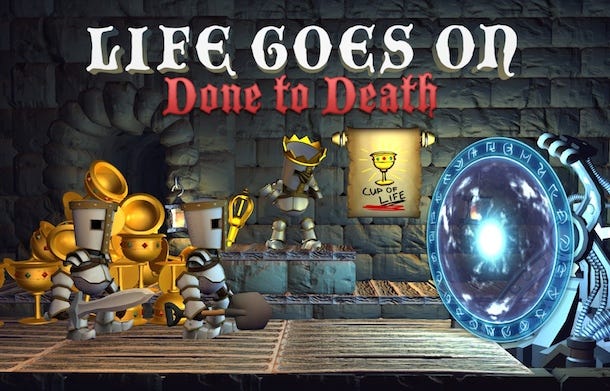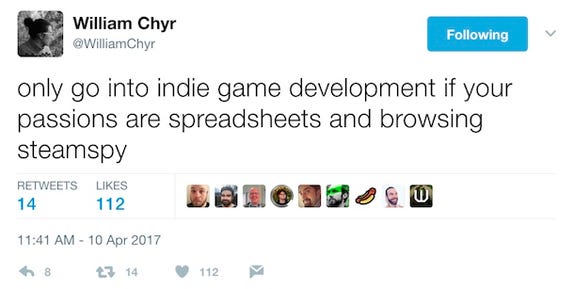
I thought we had a hit game on our hands. When we first showed it off, someone asked us how they could give us money. When we described the concept, people said they loved it. We won awards. We got media coverage. Sony, Nintendo, and Microsoft all expressed interest. We got access to Steam back when that wasn't such an easy thing to do. Success seemed certain.
If you've read this sort of article before, you probably know where this is going. Neither the 2014 Steam release of Life Goes On nor our second try with a 2016 expansion (Life Goes On: Done to Death) and PS4 port ever saw the level of sales that we expected. While I know that we have done better than many indie games, the results were disappointing even for a small team. Critically, we didn't make enough money for the studio to fund another game.
<iframe title="Life Goes On: Done To Death - Launch Trailer" src="//www.youtube-nocookie.com/embed/Gh0QTgU0fF8?rel=0&enablejsapi=1&origin=https%3A%2F%2Fwww.gamedeveloper.com" height="100%" width="100%" data-testid="iframe" loading="lazy" scrolling="auto" data-gtm-yt-inspected-91172384_163="true" id="837096129" data-gtm-yt-inspected-91172384_165="true" data-gtm-yt-inspected-113="true"></iframe>
I would be the last person to say that we made a perfect game or that we ran the ultimate marketing campaign. But my belief is that for the quality of the game we made and the level of marketing success we had, the game underperformed relative to other games.
Life Goes On currently has a 96% positive Steam user score. It won awards including a PAX 10 selection, and the expanded release has a 77 on Metacritic. We put time and money into exhibiting the game and reaching out to the press. And we had some decent success with getting reviews and exposure. But all of this failed to translate to sales.
My impression that Life Goes On underperformed was further reinforced by Bill Borman's recent article on hidden gems on Steam. By his metrics, Life Goes On is number 55 on the list of Steam's top hidden gems.
Through trying to understand the sales performance of our game, I have developed an interest in market analysis that may border on the obsessive. I never thought I would ever spend so much time researching sales numbers and analyzing marketing pitches. I've come to understand that product/market fit is a huge factor in a game's commercial performance, and I'd like to share my thoughts on why Life Goes On isn't a good fit in the modern indie games market.

Analyzing the Product/Market Fit of Life Goes On
It was Ryan Clark, the creator of the excellent Crypt of the Necrodancer, that got me thinking in terms of the gaming market. If you haven’t read his What Makes an Indie Hit article, definitely do so. He also has a great Twitch stream where he discusses games and their market potential. Ryan gets credit for almost all of the ideas that I discuss in this article.
Here are the factors that I think were major influencers of our results:
Hooks
Hooks are the core of a game’s appeal to the market. They are what make a game special and different from other games. They are the reasons why a player might want to check out what you are doing. I think Life Goes On actually does well in this regard:
You have to die. Life Goes On reverses the typical meaning of death in a video game. A death is not a failed attempt; it’s something you must seek out, so you can progress in the game.
Using your own dead bodies to solve puzzles. Flinging a knight into a saw blade, so the body bounces and flops onto a button has a special sort of morbid appeal.
The game is funny. Even though the core mechanic is grim, the game doesn’t take itself seriously and is full of Monty Python-inspired dark comedy.
The strengths of these hooks and how people reacted to them at conventions are a big part of what encouraged us to develop the game. It was the enthusiasm that people showed for the game's concept and our approach that made us think we might have a minor hit on our hands.
On the other hand, that’s not a lot of hooks compared to games like Crypt of the Necrodancer or Darkest Dungeon. While our core concept is a solid hook, we don’t have a laundry list of additional things to get excited about. And while a striking or memorable name can also be a hook, "Life Goes On" isn't very strong, and this can't be doing anything to help with its market appeal.
Genre
If I had to point to the one thing that hurts Life Goes On the most, it would be its genre. When the project started in early 2012, puzzle-platformers like Braid, Limbo, and Fez were practically the definition of what a successful indie game was. In 2013, The Swapper, and even lower-profile titles like Nihilumbra, seemed to show there was a market for our game. But the market shifted with the greenlight floodgates opening and the rise of roguelike, survival, and crafting games. In 2014, selling a puzzle-platformer suddenly became a dubious proposition.

Analyzing the data on Steam Spy shows very few indie puzzle-platformer hits on Steam since 2014. I am aware of three notable exceptions:
Never Alone features absolutely beautiful art along with gameplay created in consultation with the Alaskan Native community based on a traditional folk story.
Seasons After the Fall has incredible art and animation designed to look like a living painting.
Inside, from Playdead, the studio that created Limbo, is a game with stunning and distinctive visuals.
I'm sure I am missing other puzzle-platformers that have done better than Life Goes On in this timeframe. There doesn’t seem to be many though, and few seem to have done really well.

These examples of success had big production budgets, groundbreaking visuals, and great marketing stories. Comparatively, earlier puzzle-platformers like Pid, Vessel, and Nihilumbra seemed to indicate a lower barrier to entry for success.

I know that Life Goes On doesn’t compete on the same level as Inside. But it’s a shock to discover just how high the quality bar is if you want to make a successful puzzle-platformer today. On top of that, while Inside’s sales are good, they aren’t great given how amazing the game is. Inside is missing from Steam's Top 100 Best Sellers of 2016, and that must be a disappointment for Playdead considering the size of the team and the number of years that went into the game's development.
Network Effects
In the mobile gaming world, people talk about apps going viral, with players influencing other potential players to try a game. I think this is an overlooked factor of success in the PC and console space. While a game’s quality and hooks can contribute to it spreading via word-of-mouth, there are other game features that contribute to how a game spreads.
Consider multiplayer. Have you ever been persuaded to buy a game because a friend wanted to play with you? Similarly, if you've played any of Zachtronics' games, you know how features like leaderboards can help a game spread virally. When I play TIS-100, I want to see my friends on the level leaderboards, so I can compare how well-optimized my designs are.
Level editors and mod support provide an opportunity for players to create content they are motivated to share. These sorts of features can help a community form around a game and potentially pick up momentum of its own.
Life Goes On doesn’t include multiplayer, a level editor, or leaderboards. So even if you really like our game, you aren’t likely to draw your friends into playing it. And the lack of these features makes it harder for a community to grow around the game. Building these features would have come at a price, and other aspects of the game would have suffered if we had included them. But I suspect if we had made a less-polished game that had these features, it would have sold better due to positive network effects.
Playtime

Having a long game with high replayability is unexpectedly important in the current market. These are obviously nice traits for any game to have, but it seems they have an outsized influence on a game’s sales relative to their importance to gamers.
 Steam is constantly showing me a popup that says a friend of mine is playing Spelunky. He has played i
Steam is constantly showing me a popup that says a friend of mine is playing Spelunky. He has played i



































